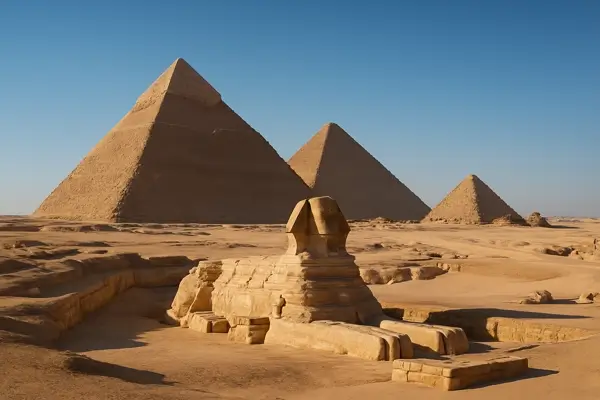
The Cradle of Civilization
Egypt is one of the world’s oldest civilizations, with a history that dates back over 5,000 years. It is the birthplace of ancient Egyptian culture, famous for its advancements in writing, architecture, mathematics, and medicine.
Pyramids of Giza
Egypt is home to the Pyramids of Giza, one of the Seven Wonders of the Ancient World. The Great Pyramid of Giza, built for Pharaoh Khufu, is the only surviving wonder and the largest of the three pyramids, standing at over 138 meters (455 feet).
The Nile River
The Nile River, the longest river in the world, flows through Egypt. It is essential to the country’s agriculture and has been the lifeblood of Egyptian civilization for millennia. The Nile also plays a vital role in Egyptian culture and history.
The Sphinx
The Great Sphinx of Giza, a giant limestone statue with the body of a lion and the head of a Pharaoh, is one of the most iconic landmarks in Egypt. It is thought to have been constructed during the reign of Pharaoh Khafre (around 2500 BC).
Ancient Egyptian Religion
Ancient Egypt had a rich and complex religious system, with gods and goddesses like Ra (the sun god), Osiris (god of the afterlife), and Isis (goddess of magic and motherhood). Religion played a central role in Egyptian daily life, governance, and architecture.
Tutankhamun’s Tomb
The discovery of the tomb of Tutankhamun in 1922 by archaeologist Howard Carter shocked the world. The tomb contained an incredible treasure trove, including the famous golden mask of the young Pharaoh, revealing the wealth and mystery of Egypt’s ancient rulers.
The Ancient Writing System – Hieroglyphs
The ancient Egyptians developed one of the world’s first writing systems, hieroglyphics, a combination of pictures and symbols used for religious texts, monuments, and official records. The Rosetta Stone, discovered in 1799, was key in deciphering this script.
Cairo – The City of a Thousand Minarets
Cairo, Egypt’s capital, is often called the “City of a Thousand Minarets” due to its many Islamic monuments and mosques. It is the largest city in the Arab world and a cultural and political hub in the Middle East.
The Egyptian Museum
The Egyptian Museum in Cairo houses one of the largest collections of ancient Egyptian artifacts in the world, including the treasures of Tutankhamun, mummies, and statues of gods and pharaohs. It is a must-visit for those interested in Egypt’s ancient history.
Modern Egypt and the Suez Canal
In addition to its ancient wonders, modern Egypt is an important political and economic player. The Suez Canal, one of the world’s most important waterways, connects the Mediterranean Sea to the Red Sea, providing a critical trade route between Europe and Asia.
